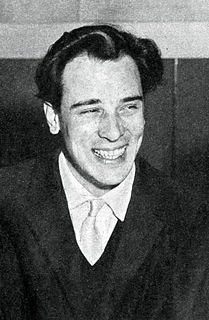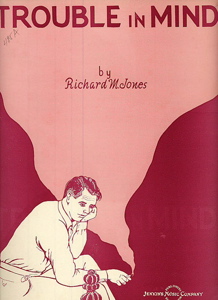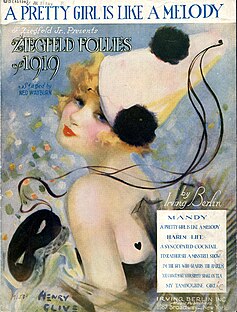Related Research Articles
Pop music is a genre of popular music that originated in its modern forms in the US and the UK during the mid-1950s. The terms "popular music" and "pop music" are often used interchangeably, although both describe all music that is popular and that include many diverse styles. "Pop" and "rock" were roughly synonymous terms until the late 1960s, when they became quite separated from each other.
The music of the United States reflects the country's pluri-ethnic population through a diverse array of styles. It is a mixture of music influenced by West African, Irish, Scottish and mainland European cultures among others. The country's most internationally renowned genres are jazz, blues, country, bluegrass, americana (music), rock, rhythm and blues, soul, ragtime, funk, hip hop, doo wop, pop, techno, house, folk music, disco, boogaloo, reggaeton, and salsa. American music is heard around the world. Since the beginning of the 20th century, some forms of American popular music have gained a near-global audience.
In music, an ostinato[ostiˈnaːto] is a motif or phrase that persistently repeats in the same musical voice, frequently in the same pitch. Well-known ostinato-based pieces include both classical compositions such as Ravel's Boléro and the Carol of the Bells, and popular songs such as Donna Summer and Giorgio Moroder's "I Feel Love" (1977), Henry Mancini's theme from Peter Gunn (1959), and The Verve's "Bitter Sweet Symphony" (1997).
"Stardust" is a popular song composed in 1927 by Hoagy Carmichael with lyrics added by Mitchell Parish in 1929. Carmichael recorded the song, originally titled "Star Dust", at the Gennett studio in Richmond, Indiana. The "song about a song about love", played in an idiosyncratic melody in medium tempo, became an American standard and is one of the most recorded songs of the 20th century with over 1,500 recordings. In 2004, Carmichael's 1927 recording of the song was one of 50 recordings chosen by the Library of Congress to be added to the National Recording Registry.

"Ti Guarderò Nel Cuore", later released under the international title "More", is a film score song written by Riz Ortolani and Nino Oliviero for the 1962 Italian documentary film Mondo Cane. Ortolani and Oliviero originally composed it as an instrumental; lyrics were later provided by Marcello Ciorciolini, which were adapted into English by Norman Newell. It has become a pop standard.

Rhythm changes are a common 32-bar chord progression in jazz, originating as the chord progression for George Gershwin's "I Got Rhythm". The progression is in AABA form, with each A section based on repetitions of the ubiquitous I–vi–ii–V sequence (or variants such as iii–vi–ii–V), and the B section using a circle of fifths sequence based on III7–VI7–II7–V7, a progression which is sometimes given passing chords.
"When the Saints Go Marching In," often referred to as "The Saints," is a black spiritual. Though it originated as a Christian hymn, it is often played by jazz bands. This song was famously recorded on May 13, 1938, by Louis Armstrong and his orchestra.

Underground is a 1968 album by American jazz musician Thelonious Monk. It features Monk on piano, Larry Gales on bass, Charlie Rouse on tenor sax, and Ben Riley on drums.
"Tea for Two" is a song composed by Vincent Youmans with lyrics by Irving Caesar and written in 1924. It was introduced by Louise Groody and John Barker in the Broadway musical No, No, Nanette. "Tea for Two" was Youmans' biggest hit.

"Trouble in Mind" is a vaudeville blues-style song written by jazz pianist Richard M. Jones. It became an early blues standard, with numerous renditions by a variety of musicians. Although singer Thelma La Vizzo with Jones on piano first recorded the song in 1924, Bertha "Chippie" Hill popularized the song with her 1926 recording with Jones and trumpeter Louis Armstrong. In many versions, new lyrics are added. However, most usually include the well-known verse:
Popular music is music with wide appeal that is typically distributed to large audiences through the music industry. These forms and styles can be enjoyed and performed by people with little or no musical training. It stands in contrast to both art music and traditional or "folk" music. Art music was historically disseminated through the performances of written music, although since the beginning of the recording industry, it is also disseminated through recordings. Traditional music forms such as early blues songs or hymns were passed along orally, or to smaller, local audiences.

"You Don't Love Me" is a rhythm and blues-influenced blues song recorded by American musician Willie Cobbs in 1960. Adapted from Bo Diddley's 1959 song "She's Fine She's Mine", it is Cobbs' best-known song and features a guitar figure and melody that has appealed to musicians in several genres.

The period from the end of the First World War until the start of the Depression in 1929 is known as the "Jazz Age". Jazz had become popular music in America, although older generations considered the music immoral and threatening to cultural values. Dances such as the Charleston and the Black Bottom were very popular during the period, and jazz bands typically consisted of seven to twelve musicians. Important orchestras in New York were led by Fletcher Henderson, Paul Whiteman and Duke Ellington. Many New Orleans jazzmen had moved to Chicago during the late 1910s in search of employment; among others, the New Orleans Rhythm Kings, King Oliver's Creole Jazz Band and Jelly Roll Morton recorded in the city. However, Chicago's importance as a center of jazz music started to diminish toward the end of the 1920s in favor of New York.

"A Pretty Girl Is Like A Melody" is a popular song written by Irving Berlin in 1919 which became the theme song of the Ziegfeld Follies. The first verse and refrain are considered part of the Great American Songbook and are often covered as a jazz standard.
"A Child Is Born" is a jazz instrumental that was later recorded with lyrics added. It was written in 1969 by the jazz trumpeter Thad Jones with lyrics added independently by Alec Wilder after hearing the Thad Jones-Mel Lewis Orchestra perform the instrumental. The instrumental and the song have been recorded by a number of musicians including Tony Bennett, Stanley Turrentine and Bill Evans, Richard Davis, Kenny Burrell, Dee Dee Bridgewater, Hank Jones and Helen Merrill.
Sentimental ballads are an emotional style of music that often deal with romantic and intimate relationships, and to a lesser extent, war, loneliness, death, drug abuse, politics and religion, usually in a poignant but solemn manner. Ballads are generally melodic enough to get the listener's attention.
Alan Rankin Jones was an American jazz pianist, composer, and lyricist best known for his composition "Easy Street".
References
- 1 2 3 4 Hischak, Thomas S. (2002). The Tin Pan Alley Song Encyclopedia. Westport, Conn.: Greenwood Press. p. 97. ISBN 0313319928 . Retrieved 2 April 2019.
- 1 2 Dodd, David; Hunter, Robert; Trist, Alan; Barlow, John; Carpenter, Jim (2005). The Complete Annotated Grateful Dead Lyrics. New York: Simon & Schuster, Inc. p. 102. Retrieved 2 April 2019.
- ↑ Kinkle, Roger (1974). The Complete Encyclopedia of Popular Music and Jazz, 1900-1950. New Rochelle, N.Y.: Arlington House. p. 366. ISBN 0870002295 . Retrieved 2 April 2019.
- ↑ Rankin, Jones, Alan; June, Christy (2013-11-26). "Easy Street". Musicnotes.com. Retrieved 2019-01-02.